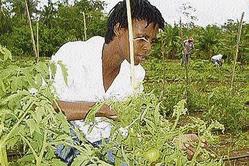
Persaud
Wilberne Persaud, Financial Gleaner Columnist
It puzzled many how a group of islands with such small land area as the West Indies could become, for their agriculture, so economically important to 19th Century Britain and the world. Some explain it as a matter of accident and choice.
Debatable. Beyond debate however, is the fact that Jamaica did have a thriving agriculture and now, still boasts pockets of economic viability and excellence in the sector.
What can we do to encourage more widespread success?
Discussion of the subject has never ceased, usually centering on sugar. Not surprising, since lands devoted to sugar cane represent the largest single use of our agriculture resources.
Add to this the labour it employs and power labour unions once exercised, focus on sugar is readily understandable.
Yet today, it does not appear that use of the sugar cane, the plant most efficient in fixing the sun's energy known to man, for crystallising into sugar is the wisest choice. There are other options.
For Brazil ethanol is the choice. With no baseline study and research results available to me, I venture to guess that is not an option for us, purely because of scale - Jamaica is too small for that choice. Yet, I am sure there are other uses that should be researched.
Research
The Ministry of Agriculture should in conjunction with the University of the West Indies fund research in this area. It would involve economics and the natural sciences, biochemistry, et cetera. The work would focus on primary research areas and as well do feasibility studies of the possibilities unearthed.
The payback period for such expenditure is long term and as a result cannot be readily undertaken by the private sector - though in the longer term private business stands to gain the real benefits.
But this is fine, the society will benefit too, in the long run. So much for what can be done for the future. What of right now?
The tourism industry relies in part on domestic agriculture for supplies of fresh fruits and vegetables.
These are agricultural products with what economists refer to as high income elasticities of demand-as peoples' income increases, there tends to be a larger than proportionate increase of their expenditure on these products.
So we're on to a good thing that should be encouraged and enhanced. But there is more.
Health and fitness are becoming more and more important as the life expectancy of populations all around the world increases-more so in the developed industrialised countries.
This is particularly evident in our neighbours to the north. As a result, there are endless possibilities for countries such as ours to benefit from an explosive demand that can only grow in the future.
Why don't we exploit this possibility? I cannot say definitively. I can make a few conjectures however and as well suggest some areas for policy to be forged.
First, in 1978 while researching causes and impacts of the rural urban drift of our population we found that the modal age of farmers was something like 59 years old.
I can bet this is still the cas some younger folk have gone into the business with fish, fruit and vegetable farming.
The main obstacle to expansion of these operations seems to be praedial larceny and lack of knowledge of markets. Both these problems can readily be tackled by government.
But what can be done to cause younger people to go into agriculture as a business? This takes us into the idea of the bright lights of Kingston and other urban centres. In 1978 I was initially puzzled and later completely amused by one response to a question we asked young people in rural Jamaica.
The guy was in his twenties and lived in the parish of Manchester. What did he do for a living? "Mi sell passenger a Mandeville" he said. The printed word can't fully capture this response.
Both my research assistant-a young man from Manchester himself-and me had difficulty at first understanding what he meant. His job was that of a tout. He 'harvested' potential commuters from Mandeville to Kingston by persuading them to take a particular bus, sometimes literally dragging them to what was then known as the 'Quarter Million', a bus in between the size of a minibus and those that now ply the Kingston routes.
He also did not fancy 'digging dut'. The land for him was not a way to make life. Music, the betting shop, 'go-go dancers' and night life were strong pulls to the town.
(To be continued).
wilbe65@yahoo.com

A student of the College of Agriculture, Science and Education examines a bearing tomato plant on the school's farm in Portland. The tourism industry relies in part on domestic agriculture for supplies of fresh fruits and vegetables. - Contributed

